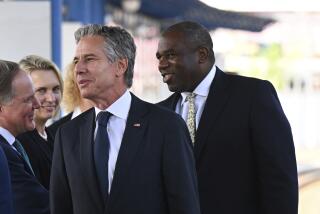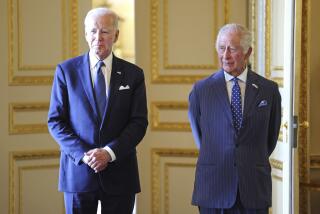Cheney Steps Out on World Stage With Pledge to Britain
- Share via
LONDON — Vice President Dick Cheney moved Monday to quiet British critics of possible military action against Iraq, as he set out on his first overseas trip as vice president, a 12-nation journey to round up support for the next phase in the war against terrorism.
Cheney, in a luncheon with Prime Minister Tony Blair, heard no open discussion of reluctance to expand the war to encompass Iraq. But growing unease within Blair’s Labor Party over taking on Iraqi President Saddam Hussein has formed a backdrop to the vice president’s visit here before he moves on to the Middle East, where the anxiety is palpable.
With Blair at his side at a news conference at 10 Downing St., the prime minister’s office and residence, Cheney said the United States and Britain would act against Iraq “only in the closest possible consultation-coordination.”
And Blair, who plans to visit President Bush in Texas next month, with Iraq high on the agenda, took pains to emphasize that no decisions had been made. However, he said, “this is a time when we discuss how important it is that the issue of weapons of mass destruction is properly dealt with.”
Visit Seen as 1st Session to Plot Anti-Iraq Moves
The vice president’s visit was being regarded here as the opening strategy meeting for what Washington is increasingly presenting as an inevitable campaign to eliminate the threat posed by whatever chemical weapons, or other weapons of mass destruction, Hussein has at his disposal.
Blair is leaving all options open without publicly committing now to military aid.
In the aftermath of the Sept. 11 attacks, the prime minister took a leading role in making the public case for attacking the Al Qaeda terrorist network. Similarly, he laid out Monday the argument against Hussein.
“The threat of weapons of mass destruction will have to be addressed,” Blair said.
“Let’s be under no doubt whatever,” he said forcefully. “Saddam Hussein has acquired weapons of mass destruction over a long period of time. . . . He’s in breach of at least nine U.N. Security Council resolutions about weapons of mass destruction.”
But the prime minister faces growing opposition from the British public and members of his Labor Party to a military campaign to topple Hussein. Seventy Labor members of Parliament have signed a letter expressing “deep unease” at the prospect of British involvement in a military operation. One Cabinet minister, International Development Secretary Clare Short, expressed outright opposition.
In the letter, Blair’s political allies said that any military action against Iraq should be under U.N. sponsorship and only after an Iraqi weapons buildup has been proved.
They said their discomfort grew with news last weekend that the Pentagon was seeking the development of nuclear weapons suited for use against Iraq, Iran, North Korea, Syria and Libya.
“This will encourage nuclear proliferation and perhaps take us all one step closer to war,” they wrote, urging instead that Iraq be pressured to readmit U.N. weapons inspectors.
Previewing an argument he is likely to make when he reaches the Middle East, Cheney said the Pentagon has not aimed weapons at those countries even though nuclear policies have been shifted to reflect new threats.
The Bush administration has looked askance at relying heavily on weapons inspectors to reduce Iraq’s arsenal, despite the seeming political appeal inspections have in Europe as a means to avoid conflict.
The question is whether Hussein is abiding by the U.N. Security Council resolution under which he is required to get rid of all weapons of mass destruction, Cheney said. Hussein is known to have used chemical weapons against Iraqi opponents, to have developed biological weapons and to have tried to gain access to nuclear weapons technology, U.S. officials say.
The United Nations and Iraq are scheduled to discuss next month the conditions for readmitting inspectors. Cheney said inspectors must operate without limits, under a “go anywhere any time kind of regime” to determine that Hussein is not hiding anything.
The vice president was scheduled to leave Britain this morning. His 11-day tour will take him to nearly every Middle Eastern state except Syria, Lebanon, Iran and Iraq. The tour was arranged as an opportunity to begin the diplomatic groundwork for carrying the anti-terror war beyond Afghanistan. But the spiraling Israeli-Palestinian violence is complicating his agenda.
Middle East experts fully expect leaders in the region to tell Cheney in private meetings that they cannot be expected to sign on to a campaign against Iraq while no progress is being made to calm more than 17 months of Israeli-Palestinian violence.
The vice president said the issues are not linked but that “we have an obligation to deal with both simultaneously.”
Polls Find British Now Less Supportive of U.S.
In Britain, where opposition to an anti-Iraq campaign is much lower than Cheney is likely to encounter later in the week, support for the alliance with the United States has fallen off considerably since Sept. 11. A poll published by the Mail on Sunday, a tabloid newspaper, found the public split over the use of British troops against Iraq, with just 45% in favor and 43% opposed. Another 12% of the 2,000 people polled expressed no opinion.
That sentiment came on top of a poll in which only 28% of British respondents said they trusted the U.S. to be the “world’s policeman,” while 38% said they did not trust the U.S. at all.
Reflecting such skepticism about Washington’s course, columnist Madeleine Bunting in the left-of-center Guardian asked, “Will Cheney grasp the perception common outside the U.S. that never has a nation squandered sympathy and moral advantage so quickly and with such wantonness?”
Six months after the Sept. 11 attacks, she said, “it is not so much Islamist hijackers as U.S. bombs that make the world feel a precarious place.”
Only the conservative Times of London supported the U.S. nuclear review, saying, “This is less Dr. Strangelove than the territory that comes with superpower status.”
More to Read
Sign up for Essential California
The most important California stories and recommendations in your inbox every morning.
You may occasionally receive promotional content from the Los Angeles Times.









